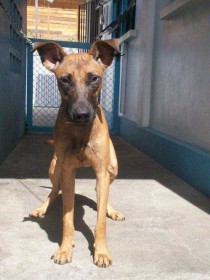Continued
What should the
diet of an old dog be?
Firstly, we must understand that older dogs – being less active – would need less energy-giving foods (less calories). If you continue to feed the old dog the same amounts and the same quality of food as when he was a young stud, he is certain to put on weight.

Secondly, we must recognize that in biology, we can only speak of averages. That which is correct for one dog is not necessarily the right thing for another pooch. The feed (energy) requirements vary from dog to dog, even within the same breed, or in dogs of the same sex. Each old dog is different and would need a different diet, and his/her own personal care.
So how do we define his needs? Well, for one thing it is important to differentiate between an active old dog, and a listless, lethargic old dog. Is it a temperamentally hyper old dog or an apathetic, sedentary dog? Moreover, you want your dog, old as he is, not to be exhibiting ‘skin and bones’ or be flabby and obese.
The rule of thumb is to feed the dog with 25-30 calories per pound body weight. The problem is how to calculate the calories. This matter is easily dealt with, if you feed a name-brand imported dog food – whether dry or in a tin. The label on the package will tell you how many calories are in each serving, and you can calculate accordingly. The situation is more difficult if you are feeding local food. Your vet will advise you how much mince or chicken or fish and rice you may feed. One thing is clear: because the older dog must eat less food by volume, the food has got to be of a high quality. This usually means that the digestive protein component must be higher (and the fat, component lower) than that which was offered when the dog was a young, energetic animal.

Actually, some authors recommend as a rule of thumb that one should use the puppy formula for the old dog.
Having said that, the protein component of his diet should be relatively higher than when he was young. Please take care not to overfeed him with two much pure protein. Such a rich diet (of meat, say) would increase the nitrogen load which tends to place an added stress on the liver and kidneys. And if the old dog can’t handle the excessive amounts of protein, the organs (especially the function of the kidneys can be compromised – kidney failure). Because of this fear, I tend to advise clients to feed more rice which is an easily digestible carbohydrate, and which contains some proteins as well, all within the rice and meat combination diet.
Examples of foods which contain high quality, relatively easily digestible protein would be cottage cheese, skimmed milk, high quality (low fat) special mince. If you notice your dog losing weight with this type of diet, then I advise you to add more boiled rice to the feeding regime at once.
Now what do we do about fats in the diet? You have always heard (and you know only too well from your personal enjoyment) that fats increase the palatability of food. However, in the older dog, fats (high in calories) are not easily digested. Yet, some amount of fat has to be in the diet, if for no other reason than to aid in the absorption of certain vitamins, and for the production of essential fatty acids.
We’ll continue this discussion next week.
Please implement disease preventative measures (vaccinations, routine dewormings, monthly anti-heartworm medication, etc) and adopt-a-pet from the GSPCA’s Animal Clinic and Shelter at Robb Street and Orange Walk, if you have the wherewithal to care well for the animals. Do not stray your unwanted pets, take them to the GSPCA’s Clinic and Shelter instead. If you do not wish your pet to have puppies or kittens, you may exploit the GSPCA’s free spay and neutering programme. If you see anyone being cruel to an animal, or if you need any technical information, please get in touch with the Clinic and Shelter by calling 226-4237.




